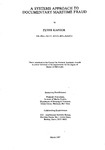Systems approach to documentary maritime fraud
| dc.contributor.supervisor | Gray, R. | |
| dc.contributor.author | Kapoor, Peter | |
| dc.contributor.other | Faculty of Science and Engineering | en_US |
| dc.date.accessioned | 2011-05-12T11:37:57Z | |
| dc.date.available | 2011-05-12T11:37:57Z | |
| dc.date.issued | 1987 | |
| dc.identifier | Not available | en_US |
| dc.identifier.uri | http://hdl.handle.net/10026.1/422 | |
| dc.description.abstract |
Wring the last decade documentary maritime fraud has caused considerable financial loss. The internationality of the crime and the difficulties experienced in the investigation and prosecution of offenders has caused serious concern both nationally and internationally. The aim of this research was to examine the system of international trade in terms of flow between institutions, and to develop a model of the system to identify areas of system failures in terms of actual or potential frauds. A database consisting of 101 fraud cases was compiled. Detailed examination of the cases identified features common to different classes of fraud. Systems approach was used to investigate the system with particular reference to Bills of Lading and method of payment under documentary credits. Conceptual mcdels of the three main contractual sub-systems i. e. carriage, insurance and payment, and of the total system were developed. The latter was used in conjunction with the database to pin-point the weak links both within the system and its imiediate envirormLent. Using a rwlti-disciplinary international Panel of Experts the Delphi technique, appropriately modified, was employed to test the hypothesised weak links, determine feasibility of implementing the recoamndations and seek information to assist in introducing measures to combat fraud. The analysis supports the hypothesised weak links identified in the environment and reccmuendations to strengthen them. Factors creating an environment for fraud are identified, along with reasons for not reporting the crime. Information required to combat fraud is identified. Prior to payment under documentary credits banks should carry out factual checks. The Bill of Lading is not a weak link but the people handling the document are unaware of its importance. Establishmnt of a Conmrcial Crim Research Unit specialising in international trade is recamrended, as is the development of an educational prograrmTo to increase conmercial awareness. | en_US |
| dc.language.iso | en | en_US |
| dc.publisher | University of Plymouth | en_US |
| dc.subject | Economics | |
| dc.subject | Ships | |
| dc.subject | Offshore structures | |
| dc.subject | Law | |
| dc.subject | International trade fraud | en_US |
| dc.title | Systems approach to documentary maritime fraud | en_US |
| dc.type | Thesis | |
| dc.identifier.doi | http://dx.doi.org/10.24382/4203 |
Files in this item
This item appears in the following Collection(s)
-
01 Research Theses Main Collection
Research Theses Main


